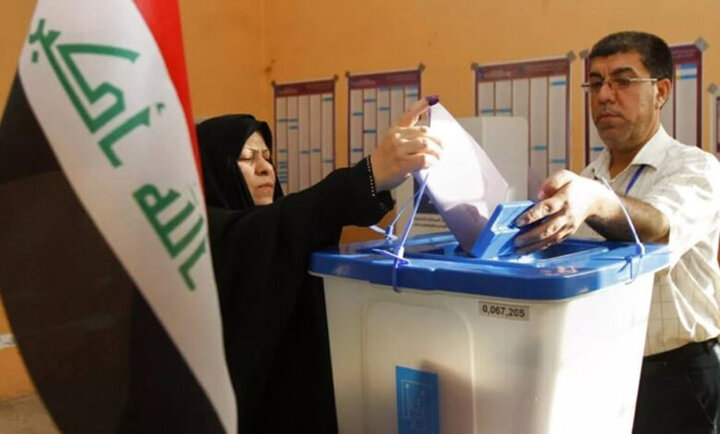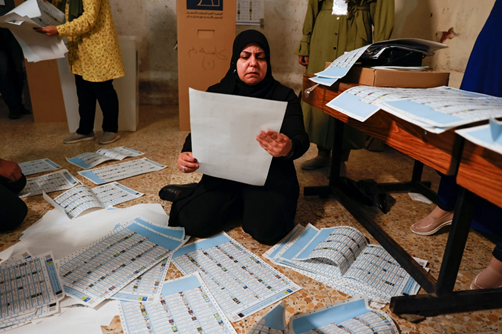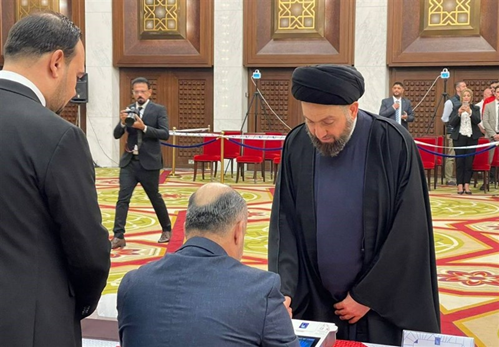Holding elections of Iraqi provincial councils after 10 years

| One of the important events in the Iraqi political arena in the past year was the holding of the third provincial council elections in this country after 10 years. |
Mehr News, International Group: One of the important events in the Iraqi political arena in the past year was the holding of the third provincial council elections in this country after 10 years. According to political experts, this election was held with complete security and was considered one of the important actions of Shia al-Sudani’s prime ministership.
According to the Iraqi constitution, there is an institution called the provincial council in every province, and in addition to parliamentary elections, provincial council elections are also held every four years. The members of this council are elected through elections and based on the population of each province, which is responsible for regulating the internal policies of the province and implementing general orders and laws issued by the central government. This council also has the power to elect the governor, deputy governor, and political and security officials in the province.
Another function of the provincial council in Iraq is to spend the budget granted by the central government, as well as to collect special provincial revenues and spend them on provincial affairs; Therefore, with financial power and appropriate decision-making, the provincial council plays a significant role in the administration of the province and is considered the highest authority in the province.
According to the constitution of Iraq, the provincial councils have wide powers, to the extent that they have the right to issue local laws and, like a small government, the affairs of the province and the responsibility of monitoring the budget. They are responsible for health, transportation and education.
An important and strategic point about provincial council elections is the election of governors and active movements in the provincial council, which are known as local governments. With this process, the political weight of the winning parties will increase for the distribution of power in the central government structure and parliamentary elections.
Provincial councils in Iraq are responsible for electing the governor and executive officials of the province, and according to the country’s constitution approved in 2005, provincial councils have the power to dismiss and Installation and approval of programs and projects based on the financial budget allocated to the province by the central government in Baghdad.
In this regard, the third election of provincial councils in Iraq was held on December 18 last year with the participation of Iraqi authorities and people. This general voting was done to elect 258 members of councils of 15 Iraqi provinces.
This election was held for the first time after April 2013 and after 10 years, which is the third election of its kind after the US attack in 2003. Previously, provincial council elections were held in Iraq in 2009, in 2018 and at the same time as the parliamentary elections, it was supposed to be held, but it was postponed many times.
These elections were held in 15 out of 18 Iraqi provinces without the participation of the Sadr movement led by Moqtadi Sadr, who had boycotted the elections. Also, provincial council elections were held in Kirkuk at the same time as other Iraqi provinces for the first time since 2005.
In the third election of Iraqi provincial councils, 296 political parties in the form of 50 coalitions and more than 60 candidates competed in individual lists. Candidates for the Iraqi provincial council elections competed for 275 seats, of which 75 seats were reserved for women and 10 seats for ethnic and religious minorities.
Welcome of the Iraqi people to the third election of Iraqi provincial councils
One of the important points of the third provincial council elections in Iraq last year was the good reception and relatively high participation of Iraqi people in this election compared to other elections.
dir=”RTL” style=”text-align:justify”>
According to the report of Baghdad Al-Youm news site, the Independent High Commissioner of Elections announced the participation rate in public and private voting in the Iraqi provincial council elections. 41 percent of Iraqi province, equivalent to 6,599,668 votes, was announced.
Omar Ahmed, the head of Iraq’s Independent Supreme Election Commission, emphasized in a press conference held in Baghdad that this commission succeeded in implementing the constitution to hold elections. It has been the provincial councils.
Success of Shia parties in Iraqi provincial council elections
But the important point in holding the elections of the provincial councils of Iraq was that despite the boycott of the elections by the Moqtada Sadr movement, political groups and Shiite parties had a significant success, especially in the south. and the center of Iraq, including Baghdad, won in this election.
In this election, the “Progress” party led by “Mohammed Al-Halbusi”, the former speaker of the parliament, won the most votes, followed by the “Nabni” coalition. We Build) led by Badr Organization Secretary General Hadi Ameri and the Government of Law party led by former Prime Minister Nouri al-Maliki won the most votes in Baghdad, the capital of Iraq.
The third election of the provincial councils of Iraq is important according to the Prime Minister of this country in that it is considered an important step in administrative decentralization.
Al-Sudani said that the provincial council elections are the government’s fulfillment of its commitments and another step towards administrative decentralization, supporting community peace and stability, and fulfilling the will of 2013 is delayed. He added that perhaps the most obvious picture of the success of this election was its establishment in Kirkuk; A place where elections have not been held since 2005.
Presence of prominent political figures in provincial council elections
Another special feature of this election that added to its importance was the presence of prominent Iraqi political figures in this election, which greatly encouraged the people and increased the participation of different classes. community in this election.
Qais Al-Khazali, Secretary General of Asaib Ahlul Haq, Adel Abdul Mahdi, former Prime Minister, Seyed Ammar Al Hakim, Chairman of the National Wisdom movement, Mohammad Al-Halbusi, former Speaker of the Parliament , “Nuri al-Maliki”, the former prime minister and the head of the “Doleh al-Qanoon” coalition, were among the prominent figures who went to the polls.
Result
The political conditions in Iraq during the past two decades were always inflamed due to the presence of the American occupation military forces and their successive conspiracies through political mercenaries and creating differences between Iraqi parties. And the role of the people through participating in healthy and fair elections was ignored.
The third election of Iraqi provincial councils was held while it was one of the main demands of the October 2019 protests.
Due to the success of the Shia groups in the third election of the provincial councils, it is expected that the position of the Shia coordination committee in the political structure of Iraq will be strengthened and stabilized more than in the past, and this process will continue until Iraq’s next parliamentary elections should continue.




